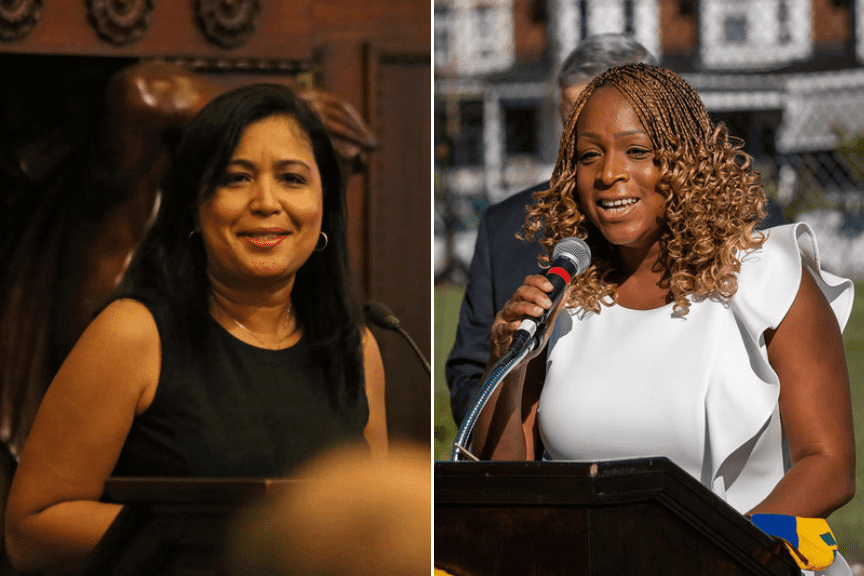Legislation will generate more affordable housing in areas of the 3rd and 7th Districts that are especially vulnerable to development pressures
PHILADELPHIA – Today, City Councilmembers Jamie Gauthier (3rd District) and María Quiñones Sánchez’s (7th District) Mixed Income Neighborhoods Overlay Bill, which aims to require that affordable housing be part of new large development projects, received final approval from City Council. This bill will apply to select tracts of the 3rd and 7th Districts that are seeing increased market pressures where Philadelphia residents will be especially vulnerable to displacement without additional policy interventions.
“The continued growth of our city is important, but it’s unacceptable if it comes at the detriment of vulnerable Philadelphians,” said Councilmember Gauthier. “With many developers prioritizing profits, regardless of the social repercussions, the best way for us to ensure that affordable housing options remain available in desirable neighborhoods over the long-term is to enact policy change. I’m grateful to Councilmember Sánchez for her partnership in this effort, and to my Council colleagues for their support of this legislation.”
The legislation will require 20 percent of the units in any new housing development with ten or more residential units within the overlay boundaries be made available at restricted pricing for a 50-year period. At least fifteen percent of those units must be on-site; the bill offers the chance to apply for a waiver from the Planning Department to fulfill up to five percent of the requirement via offsite units or a Housing Trust Fund contribution. These units must be affordable for rental households earning up to 40 percent area median income (AMI), and for owner-occupied households earning up to 60 percent of AMI. Property owners would be entitled to additional development rights, such as additional building height or reduced parking requirements. These rights vary depending on the base zoning of the property.
“Diverse, mixed income neighborhoods need strong public policy that incentivizes and promotes equitable development,” said Councilmember Sánchez. “Piloting more aggressive public policy will help us meet the greater housing needs.”
The Philadelphia Zoning Code currently has a program that incentivizes property owners to build affordable housing, but it is optional and does not require new units to be built in the neighborhoods where development is occurring. Both Councilmembers see the Housing Trust Fund as a vital resource for creating housing security here in Philadelphia, but they recognize that there is a significant opportunity for on-site affordability that presents itself with regard to new development projects, and that this should not be taken for granted, especially in neighborhoods that are experiencing heavy development pressure and are vulnerable to gentrification.
“This legislation has the potential to significantly expand housing opportunities for Philadelphians, and help to create integrated neighborhoods with improved health and quality of life between and across generations—making possible a more equitable, inclusive future in Philadelphia,” said Rasheedah Phillips, managing attorney for housing policy at Community Legal Services of Philadelphia. “The legislation is practical, simple to administer, sustainable, and balances the needs of developers and housing providers with the individuals and families who will access affordable quality housing, and the communities they will all live, work, play, grow, and thrive in.”
“All of today’s investors and stakeholders must account for how current investment values that are rising are built on a history of racial inequity,” said Dr. Davarian Baldwin, professor at Trinity College and founding director of the Smart Cities Lab. “We cannot change this past, but we can alter the course of the future. Bill 210633 begins the process of repair by accounting for a history of inequity, to create a new vision of equitable planning. Let Philadelphia serve as a beacon to the nation by building out a vision of urban revitalization where development can happen, yes – and still, a cross section of the city’s residents can remain to enjoy its benefits.”
“What we’re concerned about is balance—finding ways that development and opportunities for residents in the neighborhoods allow for a blending of people from a variety of socioeconomic backgrounds,” said Reverend Jay Broadnax of Mt. Pisgah AME Church. “We need legislation that encourages that kind of balance, and I believe that this Mixed Income Neighborhoods Overlay Bill is a critical first step in helping to foster that kind of balance.”
This zoning bill is just one tool of many that are needed to truly address Philadelphia’s affordable housing crisis. A study commissioned by Councilmember Gauthier last year showed nearly half of 3rd District households are housing cost burdened, meaning they spend over 30 percent of their income on housing expenses. Housing prices have tripled in the University City area since the 1970s. In the past two decades alone, most neighborhoods east of 52nd Street have seen their Black populations cut in half.
The demand for affordable units well outpaces the supply in Districts like the 3rd that are experiencing significant market pressures. Seventy percent of 3rd District rental units cost more than $750 per month, a price that is only affordable to 35 percent of renter households. While it will not solve this affordability gap by itself, a bill like this will ensure that neighborhoods experiencing gentrification get affordable units created at the same time.
The Mixed Income Neighborhoods Overlay bill will go into effect six months after it is signed by the Mayor.
# # #


